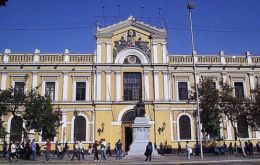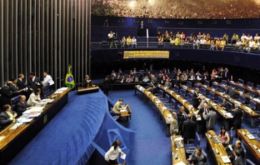MercoPress. South Atlantic News Agency
Stories for 2011
-
Wednesday, December 28th 2011 - 03:41 UTC
Falklands have three options for a new deep water port

The location of a new deep water port for the Falkland Islands been narrowed down to three potential sites: Mare Harbour, Navy Point (north of the Camber) and Stanley harbour (FIPASS) it was confirmed at the Executive Council meeting last week following a discussion of the issue.
-
Wednesday, December 28th 2011 - 03:31 UTC
Madrid has first woman mayor; promises to bid for 2020 Olympic Games

Ana Botella, the wife of former Spanish Prime Minister Jose Maria Aznar, was sworn-in Tuesday as Madrid’s first woman mayor. She succeeds Alberto Ruiz-Gallardon, mayor of the capital since 2003, who resigned to serve as Justice Minister in the new Conservative government of Prime Minister Mariano Rajoy.
-
Wednesday, December 28th 2011 - 03:30 UTC
UK ambassador in Chile “concerned” with “economic blockade” on the Falklands

The British Ambassador to Chile, Jon Benjamin, expressed on Tuesday UK’s “concern” over “countries that have joined” the Mercosur bloc in their decision to support Argentina, by putting in place a ban on ships flying the Malvinas Islands’ flag from docking at their ports.
-
Wednesday, December 28th 2011 - 03:29 UTC
Chile signs strategic science and education agreement with Massachusetts

The Chilean government has signed a strategic bilateral agreement with the state of Massachusetts, opening the way for collaborative research in the key areas of education, energy and biotechnology.
-
Wednesday, December 28th 2011 - 03:28 UTC
Chilean students end some school occupations but pledge to continue protests

Students have voted to end occupations at two of the most symbolic institutes of Chile’s public education system, but have vowed to continue demonstrations after months of protests have failed to achieve significant reforms to the country highly privatized, class based education system.
-
Wednesday, December 28th 2011 - 03:27 UTC
US criticizes Japan for intervening to halt the rise of the Yen in the last 6 months

The US Treasury on Tuesday criticized Japan's interventions to halt the Yen's rise in the last six months, saying they were unnecessary and that Tokyo would do better to strengthen its domestic economy and competitiveness.
-
Wednesday, December 28th 2011 - 03:25 UTC
US calls for appreciation of the Yuan but falls short of labelling China a currency manipulator

United States announced it will press for further appreciation of the Yuan arguing the currency is undervalued, while declining to brand China a manipulator of its exchange rate.
-
Wednesday, December 28th 2011 - 01:13 UTC
Argentine president to undergo surgery for papillary thyroid cancer next week

Argentine president Cristina Fernandez has tested positive for papillary thyroid cancer and will undergo surgery next January 4. The Argentine leader will be taking a leave of absence until January 24th, announced on Tuesday the Executive spokesperson Alfredo Scoccimarro.
-
Tuesday, December 27th 2011 - 13:57 UTC
Argentine Media bill: “a dictatorship couldn’t have done it better”

The conservative and influential Brazilian newspaper O Estado de Sao Paulo in an editorial described the Argentine government as an “austral democradura” (authoritarian regime) which is sponsoring legislation “to terrorize the media”.
-
Tuesday, December 27th 2011 - 13:56 UTC
Brazil votes 2012 budget limiting civil servants salaries and pension increases

The Brazilian Congress approved next year's budget bill, rejecting wage increases for pensioners and public servants in a bid to contain spending as volatility advances in international markets.
